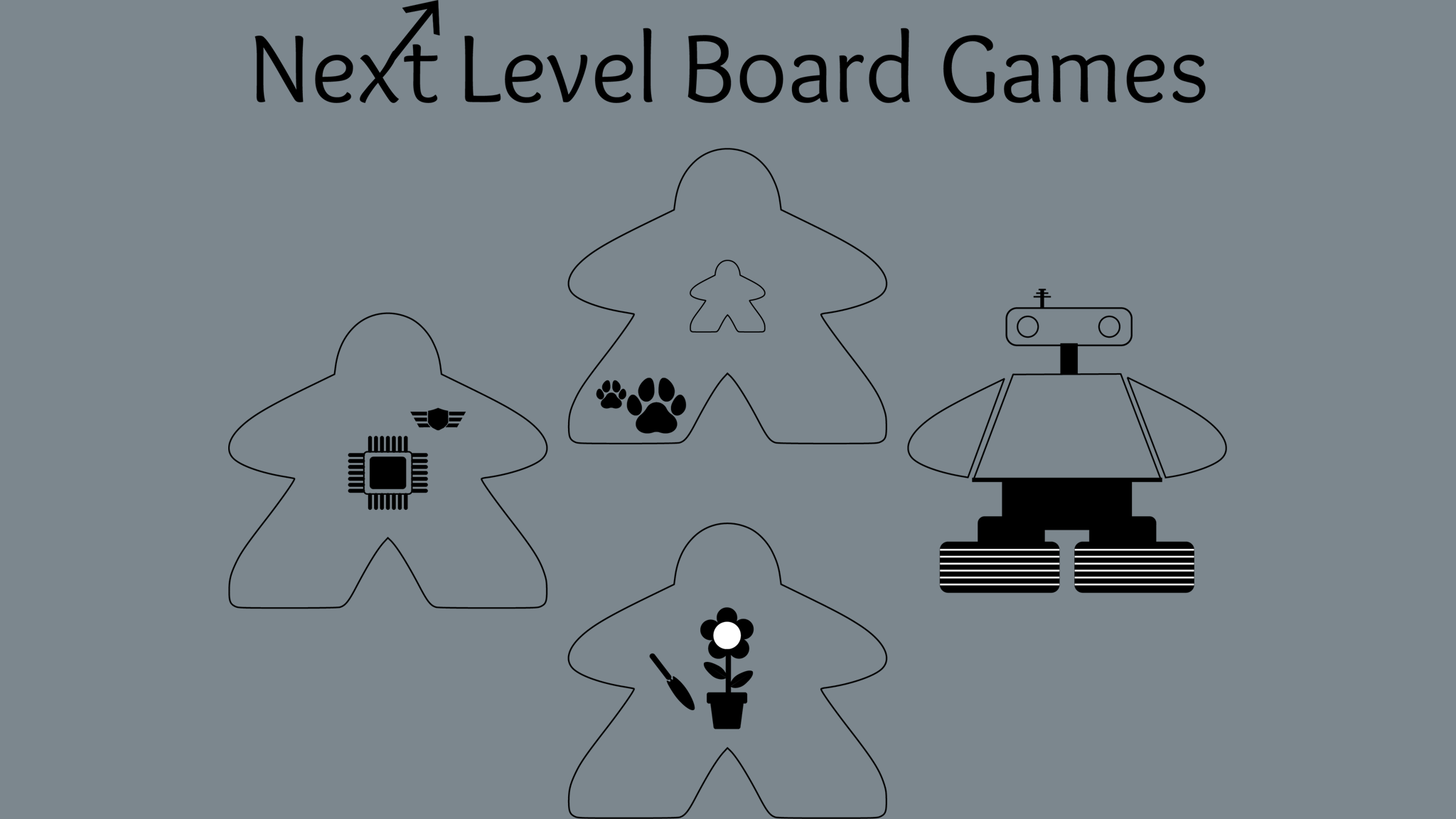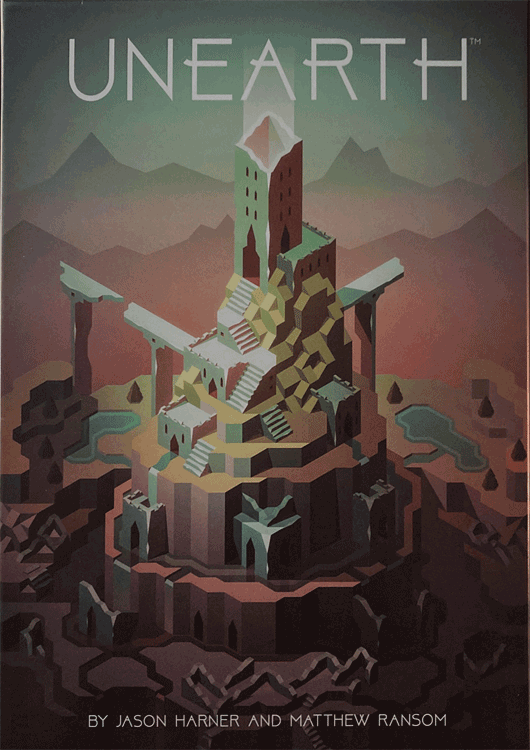Unearth is a game published by Brotherwise Games LLC. The premise of the game is for players to take on the role of Delvers working as a tribe to rebuild their ruined civilization. Players work to rebuild ruins and build wonders which earns them points. The game end is triggered when the end of age card is revealed, after the last ruins card. Once all ruins have been claimed, the player with the most points is declared the winner.
This post is broken into the following 3 sections, feel free to jump directly to one:
- General summary - consisting of information about overall enjoyment, theme, replayability, and upgrades
- Complexity - consisting of information about the rulebook, setup, player turns, and overall learning curve
- Player turns - consisting of game type, game flow, rule you are likely to miss, and favorite aspect
General Summary
Number of players we had: 3
Our play time (not including setup): 1hour 25 minutes
Overall enjoyment

Overall our group liked playing the original game, but we enjoy it more when playing with the expansion. The expansion adds an element for players who typically end up with higher dice rolls, which, once triggered, allow all players to participate. Additionally, the expansion introduces three new stones, each with a unique benefit, whereas the original stones do not have any special benefits.
Unearth is a dice rolling game that requires some strategy in addition to the unpredictability and luck that dice rolling brings. Rolling higher numbers helps players more quickly meet the claim value of ruins cards, while rolling lower numbers helps players gain stones they can use to build greater, lesser or named wonders. Claiming ruins cards and building greater or lesser wonders gains players points at the end of the game. Named wonders are worth points in addition to providing unique benefits.
If we had to pick something that frustrated us, it is that if you rarely roll lower numbers, it can be extremely challenging to gain enough stones to help you build wonders.
Theme

The theme of the game is simple and cute. There is no player board, but the artwork on the cards is nice and colorful. The expansion includes a small player board for solo mode. It also includes a small delver mini (for aesthetic purposes only). Unearth has a small footprint, is perfect for anyone with a smaller table, and it comes with a plastic insert for all the pieces that include the expansion, all of which fits into the original box.
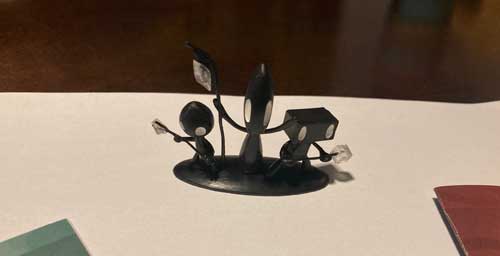
Replayability

There are a couple of things that increase the replayability of this game. First is the named wonder cards. The named wonder cards provide a unique challenge for building a hexagonal structure using the stones taken off ruins cards when rolling low dice numbers. When the first player meets the criteria for a named wonder, they take the associated token and card for the wonder and place the token inside the hexagonal structure. From this point on, they gain whatever benefit the named wonder provides.
Each game the number of named wonder cards available is equal to the number of players plus two. The original game has 15 named wonders and the expansion adds an additional nine. This means the structures being built, and the benefits awarded for building them, will vary greatly each game. There are also greater and lesser wonders that can be built, but the only benefit they provide is points.
Another aspect that increases the replayability of Unearth is that each game there is a randomly selected end of age card. The end of age cards have an associated event, which can be positive or negative, and can affect dice, stones, and more. The original game comes with five end of age cards while the expansion adds an additional two and two corresponding ruins cards.
Upgrades

The Lost Tribe expansion adds some nice features to the game and increases the replayability. This includes:
- The capability to have a fifth player
- Solo mode which includes a player board
- New delver "response" cards
- New named wonder cards
- 3 new types of stones with unique benfits
There are two main changes the expansion adds: new stone types and response cards. Each of the three new stones has a different function, such as gaining delver cards, that can help you move your game forward more quickly. Response cards are new delver cards that can be activated when any player rolls a four. This is a nice addition to the game as all players can use response cards once anyone rolls a four, not just the player who rolled it.
The expansion definitely adds to the game play without being overly complex or taking away from the original game. Also, it is worth noting that both the original and the expansion come with really nice double-sided player aides.
Complexity
Rule book
Both rulebooks are small and organized, with lots of images and explanations of how the game plays and how to resolve different aspects and components of the game.
Setup
Game setup is fairly easy and takes 5-10 minutes. Players start with two delver cards, a hidden ruins card they can use to create sets and a set of dice unique to them. Ruins cards are revealed and stones are placed on them. Random wonder cards are revealed and players are ready to begin.
Turns
Turns are pretty quick as they are made up of just two phases and are the same for each player. In the delver phase, players can play any number of acquired delver cards to help their turn. In the excavation phase, players roll one of the dice in their dice pool and place it on one of the available ruins cards.
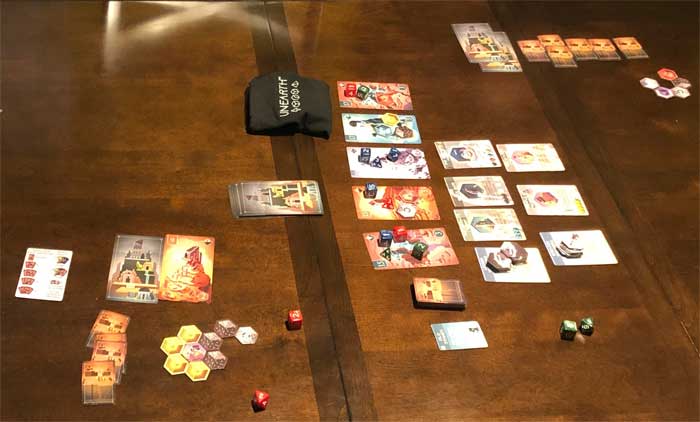
There are a couple of times when turns are more involved. For example, when resolving ruins cards and when a four is rolled while using the expansion. The ruins cards are resolved once the total of all dice on the card meet the claim value of the card. The player with the highest dice total on the card wins the ruins card. When fours are rolled while playing with the expansion, any player can use a response delver card which can change dice results and much more.
Overall learning curve
The overall learning curve for this game is not very high. If you have not played a game with a hexagonal structure, this might feel a little awkward at first. However, once you create your first hexagonal structure using acquired stones, each additional builds faster. The key is making sure you are creating the right pattern in your hexagonal structures so you can gain named wonders, greater wonders or lesser wonders using the least amount of stones possible.
Player Turns
Play type
Unearth is a symmetrical, dice rolling game that also has elements of set collection and tile placement. Collecting sets and building wonders by completing hexagons using tile placement gains players additional points.
Game flow
Unearth starts out as a slow burn then takes off. When the game begins it takes some time to gain enough stones to create a hexagonal structure, but once you have one, it is easier to build more. After a few rounds the ruins cards get claimed faster and faster and before you know it the end of age card is revealed.
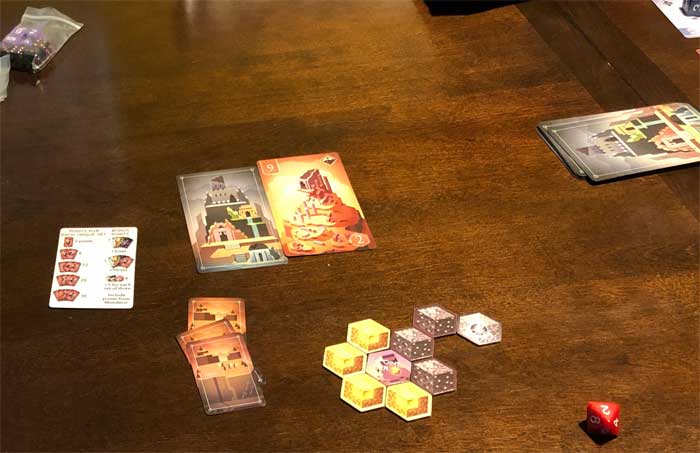
Rule you are likely to forget/miss
There are two rules you may forget while playing Unearth. First, when a ruins card is won by a player, players who also had dice on the card but did not win the card, get a delver card for each of their die on the card. Second, when a player rolls a 1, 2, or 3 and the ruins card they rolled for does not have any remaining stones on it, they draw a random stone out of the bag (rather than gaining nothing).
Favorite aspect
One of our favorite things about this game is that even if you are the player that places the die on a ruins card that meets the criteria for resolving it, you are not automatically the winner of that card. This means if a player has been working really hard to claim a card and just fell short before another player comes along to meet the claim value, the player focusing on that card does not automatically lose the card. Still, even those who lose out on a claim gain a delver card which will help them later. Also, players with dice on a claimed card regain those dice and are then free to use them on another ruins card.
Lastly, it is nice that whether you typically have high dice rolls or low dice rolls, there is a way for you to be strategic and gain points.
